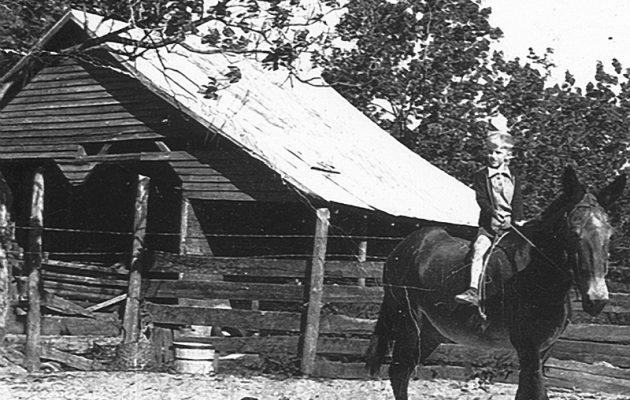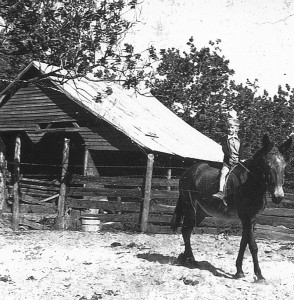John Ginter

 By Victoria Freeman
By Victoria Freeman
Resident Community News
In 1926 John Ginter’s father moved from Ohio to Jacksonville to open the Jacksonville branch of Ginter Box Company, which created boxes for King Edward Cigars. The cigar boxes were elaborate and in addition to housing fine cigars, were frequently used by school girls as treasure chests for love notes or by boys as repositories for collections of baseball cards.
Ironically, young John Ginter himself might have coined the phrase, “think outside of the box” because original thinking was his trademark. His mother, Claudine, and his father met and married in Jacksonville. Young Ginter was born in 1932 at St.Vincent’s and signs of his creativity appeared early. He remembers one event that required several layers of problem solving. “I was sailing on the St. Johns with Fred Powers who had convinced me he knew how to sail. My Doberman went with us until he decided to bail out of the boat. I jumped in the river to get him and finally floated on a mat of [water] hyacinths, hoping I didn’t run into a snake. Because my clothes got waterlogged and heavy, I had to take them off. Fred, who really didn’t know much about sailing, eventually got the boat turned around and picked me up. I walked back to Belvedere wrapped in the boat’s jib.”
Following his father’s model, Ginter became an early sportsman. His father won three state championships for marksmanship. At four, young Ginter learned to shoot at the Gun Club which was originally located at the beach. When it relocated to Gun Club Road, he spent many practice sessions there. “During the war, we saw thousands of bombs moving down Gun Club Road to the port. Some of them weighed 250 pounds apiece, some close to 500 pounds. It was quite a sight.”
St. Paul’s was the site of his education, grades K-9. “The nuns of had amazing patience with kids. Sister Aquinas was one I will always remember. She would help me with schoolwork when I needed it. One moment I remember vividly was the morning the Germans surrendered. Monsignor Lyons brought a radio in and put it near the altar. The sisters almost choked. A radio in the sanctuary was not something they had ever anticipated.”
The war intruded in other areas of life. “As teens we would try to get Mr. Graham at the boat yard to give us a little extra gas. Rationing was keeping everyone’s gas gauge low and Mr. Graham was issued gas for boat patrol. He usually would give us a few gallons and at that time it was enough to keep us going two weeks.
“If we drove to the beach, we got into tar. It was everywhere on the sand and came from torpedoed boats. They would come out of the river’s mouth into the Atlantic and be hit by the German subs. Eventually the tar sank and was covered up by the blowing sand.”
Back at Robert E. Lee [High School], Ginter’s creativity unfurled into minor mischief. “Our favorite prank was the lunch swap. The lockers had no locks and everyone’s lunch was packed in brown paper bags making it easy to swap lunches. We’d sit at the table and listen to folks complain about their choices. Seems everyone had told their mom to quit making peanut butter and jelly sandwiches, but the PB&J’s kept showing up.
“After Lee there was some college, some military, and then I began working with trotting horses. At 12, I had seen a movie about trotting horses – “Home Indiana” – that stayed with me. I became hooked on that sport. Hal Lynch had a stable of trotting horses. Hamilton Adams was training horses. I bought my own horse and worked out at the Driving Club, which had a half-mile track. In 1951, I hit the road with a county fair trainer and the horses. I raced in New York, Chicago and Lexington for several years before I returned to Jacksonville to work in the box company and go to JU for some courses. I thought about becoming a veterinarian, but didn’t feel like giving up the seven years that would require.”
Then, in 1957 Ginter’s creativity turned to a choice of life mate. He met Myrna Catalina Bauza, a pediatric resident at the Duval Medical Center. Myrna, a Cuban, was the only female resident in the class. On January 3, 1957, eight months after their introduction, they were married. They had three children: Mimi, Joe and Mitzi. Tragically, Joe died in a tractor accident.
Bauza was a medical pioneer. She likes to reminisce about polishing her English by listening to the Ed Sullivan Show and reading Perry Mason novels. She remembers having early difficulty understanding some words because pronunciations were muffled through surgical masks. Overcoming obstacles, she became the first woman president of the Florida Pediatric Society in 1979.
Ginter practiced on Myrna when he was learning the Morse Code for his ham radio station. A serious radio operator, he had to meet the fifteen words per minute requirement before he could get his license. He opened his station K4UYB in 1959 and still retains his license. Indeed, he has served as an intermediary for many emergency messages and for an admiral who needed to conduct business at Guantanamo during the stressful Bay of Pigs era.
For Ginter, life was, and is, rich and full. He has been a private pilot, a serious fisherman, a sportsman in several other areas, and he is currently a devoted grandfather and a loving husband. Having survived several serious health challenges, he seems to have taken seriously the prescription for 21st century success that says one should, “think outside the box, but inside the room.”






